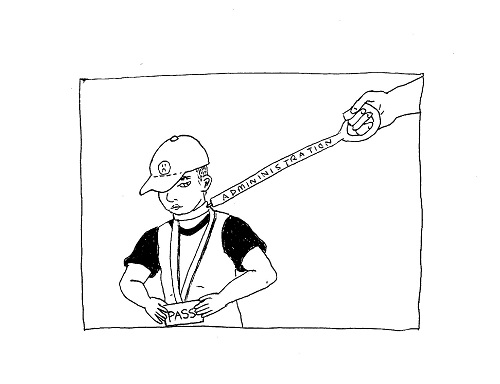
Editorial Cartoon
Passes versus planners, controversy continues
October 6, 2015
Changing seasons and the onset of fall colors mark the start of the new school year, a time when students generally welcome a plethora of adjustments and changes such as new classes and teachers. This year, Virginia Beach City Public Schools (VBCPS) instituted new rules and regulations that have not exactly ‘sat’ well with students and faculty members.
One of these new policies is a new hall pass system, made necessary by the city’s decision to discontinue the supply of student planners to meet updated VBCPS initiatives. Aspiring to digitize the student environment as much as possible, achieve a higher level of sustainability, and save money, students are encouraged to download their own planner application on their device or purchase a city-wide planner.
In past years, each student was administered a planner, specific to the school’s calendar and complete with a weekly hall pass. In order to leave the classroom, a student simply filled out the pass section in their planner and obtained a teacher signature.
The lack of a universal planner made essential an alternative system for traveling the hallways. The newly instituted hall pass system requires teachers to fill out and sign a pass attached a clip or lanyard, which the student must wear around their neck at all times when outside the classroom. The pass color corresponds to the floor, discouraging students from wandering too far from their class and those that fail to comply are written up.
Despite the system’s practicality in discouraging students from meandering around the hallways in an attempt to spend less time in class, the structure makes leaving class to use the restroom unnecessarily difficult and juvenile.
Beside consuming precious class time, the concept of having to micromanage teenagers to this extreme seems to contradict the importance of responsibility that society, and schools in particular, attempt to instill on young adults. Many of the students walking the halls drive to the school every day, or will be voting in the next election, so monitoring their whereabouts by forcing them to wear neon colored lanyards seems to be a regression from their daily level of responsibility.
According to Harvard trained psychologist Dr. Robert Epstein, America is indeed stunting the growth of teenagers into capable adults. By failing to allow teens the amount of responsibility they are capable of, they are perpetuating depression, anger, and other signs of teenage angst, negatives that are not present in hundreds of other countries where teenagers are treated as adults. Likewise, raisingchildren.net says that in order to allow students to learn to exercise good decision making, authority figures must shift responsibility and allow them to journey toward independence.
Although the presence of the pass system may increase time spent in class by discouraging taking laps of the school hallways, there is a point where students must be responsible for their own learning. The desire to learn and participate in class will not stem from preventing students from going elsewhere, but from their own realization that their education will enable them to succeed in life.
Although choosing to no longer supply school planners could increase student responsibility by forcing them to truly think about their organizational system, as well as save money and trees, a more efficient and practical hall pass system is a necessary change.
Good or bad, change is guaranteed and without change there is no growth. However, in the future, high schools should be careful to create rules and systems that treat adolescents as the young adults they are, encouraging them to take responsibility for their actions and education, rather than babying them into behaving.